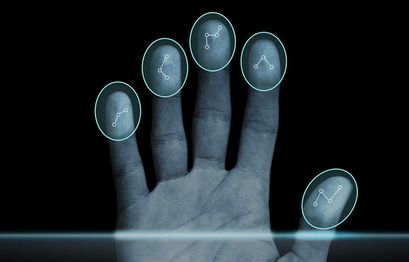Within the past few months the governments of India and Mauritius announced they are producing government identification that incorporates biometric components.
In the case of Mauritius, fingerprints will be stored on a contactless electronic chip along with civil status documents and other data that can be used for security purposes.
The Indian government shares the motivation of security but they are also struggling with the estimated 45-60% of its population that are unbanked.
Taken at its high level the number of unbanked people in India is roughly 10% of the world’s population.
Many of these 700,000,000 lack any sort of documentation at all – no birth certificates, drivers licenses or passports. Perhaps they have never had them, or they were lost in one of many relocations. Whatever the reason, the lack of proof of identity prevents their participation in a world economy that desperately needs them.
The identification includes a unique, 12-digit number that the holder has for life. The Aadhaar (Hindi for foundation) number is connected to a data base containing the person’s photograph, iris scans, and fingerprints.
Having basic identification allows someone to receive government aid and obtain proper health care. It also allows people to apply for a bank account.
Having a bank account makes it easier to get small loans and is more secure than carrying cash around. The bank account and identification mean less collateral is required when it is even possible to get a loan, and that loan will come at a lower interest rate, which allows better participation in the economy.
Just having the identification will be a boon to the Indian economy as it will drastically reduce identity theft and fraud, which are significant issues in countries like India, where as much as 40 percent of government aid goes to the wrong people.
The convergence of technology on a couple of fronts makes it easier than ever for people to participate in the economy. Mobile phone infrastructure is reaching more remote parts of countries every day, meaning people do not have to travel long distances to use banks and other services. The new identification, activated by a number similar to your social security number, makes it much more convenient to conduct such basic activities. Increased convenience often equates to increased participation.
For some, the use of biometric date opens up ethical issues. How far can the governments go with our data? What are acceptable and unacceptable uses of it? If they partner with private corporations (as is often the case), what safeguards are in place to prevent abuse?
From a practical standpoint, many see the positives gained from increased participation in society far outweighing any potential for misuse.
“Many developing countries have a lack of the infrastructure that is required to support proper economic development,” offers Dr. Steven Miles, a Professor and Maas Family Endowed Chair in Bioethics at the University of Minnesota’s Center for Bioethics. “In many parts of India you can buy any identification you need on the street.”
Economies racing to catch up to the west are struggling to adapt administrative systems to rapidly-changing modern realities. Not only are they behind other nations but they are also behind criminals who easily exploit these weaknesses. Using biometric data is one way to quickly catch up.
What a benefit it will be to the developing world. Dr. Miles cites currency changers, key economic players in many regions of Pakistan.
“Many people walk to popular areas where currency exchangers basically sit with basketfuls of money out in the open. It is a huge security risk on both ends.”
These intermediaries were accused of funneling money to Al Qaeda, but for many Pakistanis, there simply was no other way.
“With this identification, you can now buy goods and make deposits with a cell phone,” Dr. Miles offers. “The problem is that a large group of people essentially keep their money in a hole in the ground and have no ability to participate in the economy.”
Of course there are scenarios where biometric information can be used for nefarious means, situations whose perceived likelihood are enflamed by pop culture productions such as 24 and Mission Impossible. Given the obvious need to give a few billion people a hand up and bring them into the twenty-first century, we have to incorporate this best-solution technology while mitigating risk.
It involves a mind shift for many.
“The key is to not contain the acquisition of data, but the flow of data,” Dr. Miles offers. Developing safeguards that prevent or at bare minimum seriously curtail the ability to misuse the data is the most practical way to approach this problem.
As for privacy concerns Dr. Miles offers a blunt perspective. “Privacy is largely gone. People need to get over it.”
In the western world much of our privacy is willingly given away, given our addiction to social media and boundaries that erode daily. In other parts of the world people are used to having no privacy, so the swap of non-existent privacy for greater participation in the modern economy is an easy choice.
“Do you think they’d notice the difference in China?” Dr. Miles asks.
The developed world is grappling with some weighty biometric issues. Dr. Miles mentions the use of DNA banks and tissue as one. Do we take the DNA of all people arrested or only those convicted? What level of crime is the standard? Do we allow a person’s past history to help us determine whether DNA should be taken?
DNA samples of all armed forces personnel are taken so they can be used should someone die in combat and need to be identified post mortem. What do we do with the samples once the person leaves the military?
Your doctor orders a DNA test for one condition and it reveals something unrelated to the test. Your insurance provider, who covered the cost under your policy, finds out about the unrelated condition and cancels your policy or jacks up the premium.
These are serious issues, ones that need to be dealt with as we adapt to new realities, ones that include increased use of biometric information. These issues are ones that many countries would dream of having, for that means most of their citizens are participating in the modern economy.
Many people are worried about the level of involvement corporations will have with developing tools involving biometric information. Look away if you feel big corporate plays too big of a role in our lives already.
“We are dependent on them to be beyond a subsistence economy,” says Dr. Miles.
Technological development is driven by the private sector. This area will be no different. Practical biometric solutions are already keeping us safer, advises Dr. Miles, we just have to take the initiative to use them.
“How many times have we heard of someone losing a laptop containing valuable information? For a hundred dollars you could install thumbprint technology that would make that issue go away.”










